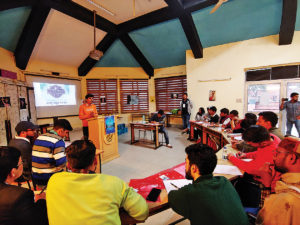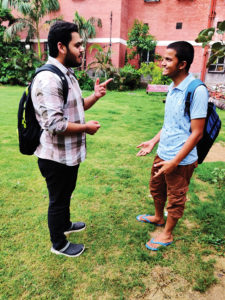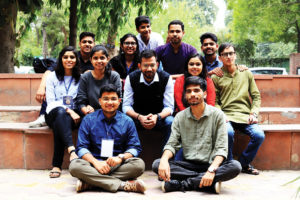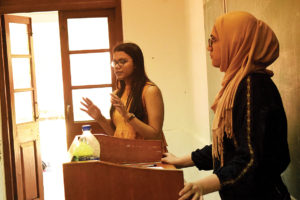Universities are places where ideas and diversity thrive. Where any ideology is taken on board and discussed
“One of the debates which I still remember was when I was in my first year of college”, Utkarsh Jain a senior now at Ramjas College and PRO for the debate society, says. He narrates the topic as we sit in the lawns of the college on a dark, rainy afternoon: “The topic was — ‘I should burn the flag of India if I feel that the country is not fulfilling my basic needs and aspirations’.
“The audience was not in favour at all. It was the obvious points, like why should one burn their country’s flag? It symbolises unity and so on… But after the debate, half of the crowd changed their minds.” And that is the power of debate and thus the importance of it.
Last week, Aligarh Muslim University (AMU) was in the news for the heightened security around its campus after there was a notice on social media about a debate in its premises. This was on the very contentious decision by the Centre to scrap Article 370 and 35A in Jammu and Kashmir — and removal of internet, cellular, landline services, and restriction of movement by enforcement of curfew.

In such a case, one wonders what would have happened if a college in Delhi were to take up the topic for discussion. Would it face the same police enthusiasm? One may think yes, if one remembers the perceived nemesis of the right —Jawaharlal Nehru University or more famously JNU.
In these times of muzzling, when social media posts get scanned and can land one in jail, how do students’ debating societies in Delhi speak without fear?
Has the growing intolerance narrative seeped into the college life of a Delhi student? Or has much of the condemnation only been thrown JNU’s way? The more we look, the more we find that colleges and students are able to — more often than not — project their viewpoints. And this may be down to clever ways in not directly naming and shaming — or self-censorship.
Muskaan Malhotra who is in her second year of economic honours at Shri Ram College of Commerce (SRCC) says that their debate society’s platform gives them the chance to speak on all issues and a lot of times on nationalism. “We don’t steer clear of any topic but the fact is that we don’t usually find people agreeing to the violent form of nationalism or pseudo nationalism.”

When they do venture out for an inter-college or university challenge, then she confesses that certain restrictions are enforced, like “You cannot say terrible things about the current government”.
This is not just restricted to one college. Arora, an English honours student at Kirori Mal College acknowledges that complete unabashed freedom of speech is not practiced. “When we are going out for debates, we tell the freshers that even if you are talking about certain policies or anything that includes the current government, don’t take the political party’s name or a particular person’s name.”
Manya Arora, who has been part of a debating team since she was in 6th grade at school, points out that in the society itself the atmosphere is completely free, but once they step out, rules change. “It’s a precautionary measure or a self-censorship. It doesn’t hinder our debate if we don’t take a leader’s name or party’s name.”
In the case with AMU, Arora believes if an instance such as this came up (where they would debate on Article 370, and take a stand against the government’s action) she would be okay with it. “We tell freshers to scan newspapers so that current topics can be debated upon. The more you read, the more you know. Being in the debating society, I have to learn about everything.”

And the fact that the debating societies are still thriving speaks for the importance people give to rational ideas of thought and discussion. “We have two wings —English and Hindi and both are very active. Our tournaments are one of the most respected ones. We are open to all as we don’t believe in bringing in trained debaters. We prefer those that join are keen on debating and leave the college as debaters.”
KMC has a strength of 25, including its second and third-year batch while many more are joining in from the fresh batch of students.
In Ramjas too, the two debate teams are thriving. The Hindi team was established just about three years ago.
The beauty in debating team’s recruitment and training process lies in being able to learn how to argue both sides of a coin while having their own ideologies intact.
During trials which are being conducted at the debating society at Ramjas College, the importance given to knowing and acknowledging the other side is key, Jain points out.
“We asked a student: Which ideology do you support? And which ideology do you think should fade away from this earth? His answer to the second question was Marxism. So, we asked him to speak in favour of Marxism for five minutes”.
Being logical and rational are key. KMC’s Arora points out that the debate society taught her the two values while at the same time giving the ability to agree to disagree — something politicians of this day and age are in dire need of.
“If you are greedy for power you would say anything to gain that power. We could tell them debate on your points but don’t go against the debate ethics. But ethics is a subjective term for various politicians”, is her response to our question if politicians should first be given lessons in debating — skills missing in the current parliament discussions.
Jain points to Plato’s thinking that philosophers would make the best rulers. “Politicians cannot be taught how to be logical; they are from another race; they cannot be taught this art of debating, I feel. They are very good storytellers but a debater has to analyse all viewpoints” and he too adds that it will be very difficult to teach politicians to be debaters.

What the politicians are unable to do — to be able to work with people of different viewpoints —students of the debating societies show in practice. Saurabh Suman, general secretary of the Hindi team of Ramjas’ debate society, says that there are various people in their group; those who have an RSS ideology and those who are strong Marxists. There are also many affiliated to some student wing of a political party, but once they are on the team, that ideology does not permeate in.
“We don’t pick only the ideology we support; we try and get many diverse voices in our debate team. Multiple ideologies make for a better team. We tell our first and second years that whatever you may support, that ideology should not hurt the person sitting next to you, or the society as a whole. We try to be strict and say if you hurt someone with your ideology or are dominating the discussion, then you will be thrown out of the society.”
Jain cuts in and talks about the time he and his team-mate had to argue the point that the current BJP government is more Gandhian than Congress. “It was the topic at Hindu Colleges’ semi-final round of parliamentary debate a few months back. Although we lost 3-2, the debate was very good. We felt like it was quite the challenge in front of us, but we were able to comprehensively argue our points.”
Jain, who hails from Ludhiana, also has a background in debating at school. “I did my debates back then in English, but once I came to DU I realised that English is not my cup of tea.” In this, two different viewpoints emerge, as always.
“I didn’t like the way the English circuit debates take place – though they are doing very well. It’s just that I think Hindi is less formal but at the same time debaters speak very respectfully to each other and are humbler. In the English sector, you will see that seniors of English will feel like seniors. People have different opinions but that’s my perspective — and Ramjas has taught me that having your own opinion is okay.”
“Ramjas has strong student politics and it is such that if there is something that doesn’t sit right with the people, then other colleges may keep silent about an issue but Ramjas will not. In fact, the college authorities may even call the police but the students who go to protest or demand something from authorities will not be silenced.”
In the context of Article 370 too, the students have not remained silent. Juniors who came for trials were first given the topic to debate on the present situation of Kashmir. Jain says that with many members of the society coming from student unions, they joined protests at Jantar Mantar and DU colleges in North Campus will be organising similar observances. “Of course, in the competitions we debate the topic given to us, but on a regular basis we try and analyse critically what is happening in the country.”
Compared to the scenario at AMU, does he feel they are more protected from the strong arm of overarching laws? It may be, he says, that being in DU makes one feel more protected. “The thing is there will always be people who will oppose your ideas, there are bigger powers who will oppose your ideas”, but the trick is, as he suggests, to learn the art of making one’s point without hurting anyone. “Ideas need to be presented in a way that no one is hurt. There’s a way to say how you feel, speak in a way politicians understand and at the same time be a diplomat when you are in an open space.”
“The people who judge you on the panel won’t tolerate illogical comments or points. When I was in my first year, the pattern was different from that at school. Here it’s not just about what the institution should do but it’s also about what they are doing wrong in the present circumstance. We speak about theories of different political parties, ideologies about thinkers, events in history. We talk about sex, pornography, gender, communism, women empowerment. You pick any field and we have talked about it.”
And they are able to do that because of the diversity of people which are part of the debate teams. Like that of Lady Shri Ram College (LSR). Stuti, a member of the debating society, says that while the college is a liberal art one a lot of diversity is represented with people from history, political science, sociology, economics, and even math and science.
LSR has an open debating society, which means anyone can join, while to go through competitions one would have to pass through a selection process. The society is presently, with the freshers in tow, a strong team of about 220 people.
She interestingly points to the space that leftist ideas get, while the other side gets less. “In my college, I have never felt that any topic is off topic but I would say that a lot of debates and competitions lean on the left-liberal side. That’s just how the general discourses at universities are.”
She thinks what people forget is that many come from very different backgrounds with different perspectives. While questioning is encouraged to a certain extent, Stuti thinks that sometimes people forget to question liberal ideas. “It’s not good. Liberal arguments and leftist ideas should be questioned. It’s a good thing but not good if you forget to take into account a different narrative. I don’t think any dominant narrative is good. There are conflicting truths that co-exist.”
A couplet by Faiz Ahmed Faiz called Bol is what the debating society of Jamia Milia Islamia is named after. Its convenor Dr Sheema Alim, says that with almost 200 students, which includes some very active members, her team just kept growing since the society was started in 2002.
The society got its leg-up in 2012 when it began organising its own national debate — Dr Zakir Husain National Trilingual debate (Hindi, English and Urdu). Her students have gone on to work in television as journalists, she claims proudly. That’s the training they have received from being a part of the debate teams. “One of my students said that an engineering student left his course and came here to take up Hindi and join our debating society. Such is the enthusiasm people feel towards this”.
The fact that no censorship is exercised on topics, which are decided by discussion between her and the students, is what she thinks has helped the society.
But while Jamia is a Muslim university like AMU, it has largely been able to steer clear of controversies at a time when minority institutions have reported feeling the heat from those wielding power. “AMU’s political environment is different. We are, in contrast, very open. My students are of different faiths and we discuss any topic,” says Dr Alim.
But the dicey reputation of AMU is something that affected even someone more attuned with things around. Suman confesses that as a young man hailing from a conservative family in Bihar, he learnt many things in Delhi. And perhaps another learning curve was the time he went to AMU earlier this year, after the Balakot strikes carried out by the Indian Air Force on Pakistan territory.
The University then was charged up, he says, or at least that is what the TV channels had indicated. “My mother called me up and asked me not to go for the competition but I went.” What he found instead, he says, were people who were more respectful than anyone he had met and who took care of them.
Despite many who may want to throttle voices, many colleges in the Capital are still able to have a healthy debate no matter what the majoritarian view may be.





